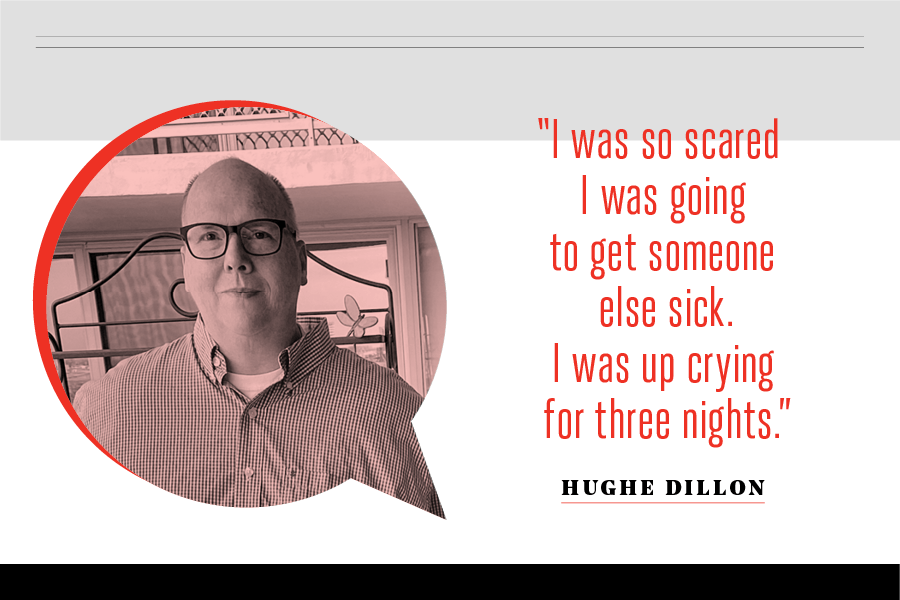My Pandemic Story: HughE Dillon on Surviving COVID-19 and Wanting to Do More to Help
The party photographer and man-about-town wants to play a part in finding a cure for the coronavirus.

HughE Dillon, party photographer, man-about-town, and COVID-19 survivor.
Published as a part of the “This Is My Pandemic Story” article in the May issue of Philadelphia Magazine. Here, HughE Dillon, party photographer, man-about-town, and COVID-19 survivor, shares his experience.
I was on a cruise at the beginning of February. Norwegian. Just to Mexico and back. And they were already doing all the things — giving you the hand soap, the Purell, everywhere you went. And no one was allowed to get food from the buffet themselves, either. I knew that was going to be a problem, because I’m like, “Two strips of bacon? No. I need five strips of bacon.”
But I don’t think I started thinking about it a lot until March. And even then, I felt like I was a little bit in the dark. I mean, the President was saying it wasn’t serious, right? No one seemed to know how it was spread. On the 7th, I shot three events. And the Mayor’s Masked Ball was that night, wasn’t it? Everything seemed normal. Then on the 11th, all my jobs started canceling. So I just stayed home.
On March 16th, I had my first symptoms. It wasn’t the severe symptoms people were talking about, but I had the cough and then these other things that no one was seeing then, but now people do — the backache, the low fever. This is what it was like to have mild symptoms.
On the 17th, I talked to my doctor and explained things. I’d shot three events and been to a funeral. I’m 56. I have diabetes, I’m overweight. I had these risk factors. I got the test. They did it right outside her office. It was early, so how blessed and lucky am I?
And then on the 20th, I got the results, and it was positive for COVID-19. I notified everyone. My family didn’t want me to be stigmatized, but I felt like I had to. Up to three days before you show symptoms and then the day of, that’s when you’re most contagious. Did you know that? The Department of Health called me after I got my results. This woman talked to me for an hour, explained everything. She gave me her phone number. It made me feel like they really cared. Like they were really on top of it.
Everyone I was in contact with had to get tested and be quarantined, but everyone — even my husband — was all negative. I was so scared I was going to get someone else sick. I was up crying for three nights.
After I got my positive result, the symptoms got really bad. My fever spiked to 102. My whole body hurt. Even my hands hurt. I was exhausted, and I slept 18 hours a day. I was nauseous. I don’t even remember a lot of that weekend. On the 23rd, when I was really sick, I called the Department of Health, and I couldn’t get through. They must’ve been overwhelmed.
My fever broke on the 24th, and I started feeling better. I haven’t coughed yet today, so that’s good. I was told I have to go three days without a fever and seven days since my first symptoms before I can leave quarantine. I just want to take my trash out! But I’m going to wait. I want to be perfect. The last thing I need is to go out and have someone say, HughE Dillon coughed on me. I’m working toward donating my blood. There’s a plasma company that can do it here. The problem is, I’m gay. And if you’re gay, you can’t donate blood unless you’ve not had sexual relations for three months. That’s what the FDA says. And it used to be a year! They just changed it. I’m in a monogamous relationship. I’m married. And you’re taking me at my word anyway, so why can’t I help? Three months? There are so few COVID-19 survivors out there, and they could save a lot of people.
Oh, see? There, I just coughed. Now it’s seven more days. Or eight. I think I’ll wait eight more days.
Published as part of the “This Is My Pandemic Story” feature in the May 2020 issue of Philadelphia magazine.


